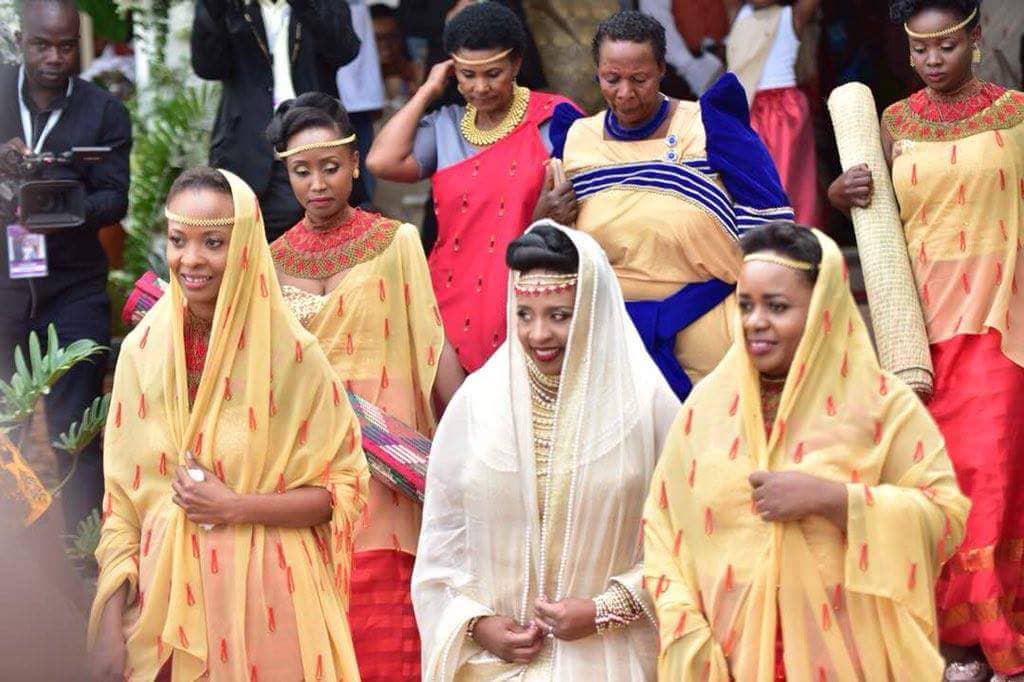The banyankole tribe
The Banyankole tribesmen are a nomadic-pastoralist group that reside in certain parts of Western Uganda. This group of people practised a peculiar marriage custom that dates back to the 15th century in the Bantu Kingdom of Ankole in Uganda.

For many years, the Banyankole tribe had a different perception of what the duties of an aunt should be, particularly on the wedding day of her niece. The custom although outdated, was one that required the aunt of the bride to have sex with the groom so as to test how virile and potent he was.
Apart from sleeping with the groom, the aunt also had to confirm that the bride-to-be had kept her virginity before marriage. It was only when virginity was confirmed intact that the couple could be allowed to consummate their marriage.
Marriage in this Bayankole tribe is of great importance as parents derive joy and pride from their children’s marriage.
According to this Ugandan tradition, when a girl gets to the age of eight or nine, it is the duty of her aunt to groom her for family life.
Virginity in this culture is held in high esteem so the girls must abstain from premarital s€x.
The Ankole tribe considers the slim physique unattractive. To them, fat is simply sexy. So when girls get to the ages eight and nine, they are required to go through a fattening process. This is usually done to speed up the weight gain of the girls so they can attract a husband.
The Banyakole marriage involves several ceremonies including a Giveaway period know as “Kuhingira” where the relatives and friends of the bride present her with gifts such as cows and other food items to take to her matrimonial home.
On the wedding day, a feast is organized at the bride’s home where the father is to slaughter a bull while at the groom’s home there is also a feast to consummate the marriage.
But first, there has to be one last ceremony, that involves tests that must be done by the bride’s aunt.
It involves the bride’s aunt testing the sexual ability of the groom by having s€x with him. This is to make sure they are potent.
During the act, she learns all his s€x tricks as well as favorite styles so she can gift her niece with pointers on what the groom likes sexually.
After confirmation is done the bride is then taught by her Aunt and allowed to consummate the marriage by being sent by her Aunt to the husband with her blessings.
When the date is set, girls are restricted to the indoors where they are fed beef, millet porridge and force fed sizeable amounts of milk. For the female among the Bahima, being fat is the criteria for attractiveness.
One of the most significant traditions involved in the marriage rite is called Omugamba, during which eight items are given to the man's family by the girl's family.
Omugamba
This is a stick that contains the assortment of gifts for the man's family. Included in the stick are the following gifts.
Ebyanzi, is a collection of wooden vessels made from smoked black wood. The exterior is then layered with aesthetic handmade covers called 'emihaiha'. These are woven with sisal into geometric patterns. Ebyanzi are used during milking, serving and storing milk.
Ekirere, this small calabash is used for taking skimmed milk and preparation of yoghurt (amakamo). The local yoghurt is made from raw milk in the morning by sieving.
Eicuba, is a wooden bucket used in collecting water for the cows. It is used to draw water that is then emptied into a drinking trough. The process of giving the cows water is called 'okweshera'.
Rukomyo, is a personal hygiene accessory. It is a perfume pot containing scented smoke. It is designed with three holes through which scented smoke escapes.
Ekicunga, a pot made out of clay. It is used to fumigate gourds and milk pots.
Akacwende, this calabash is used to make perfumed ghee which is used as vaseline for women. Ghee is mixed with a few scented herbs for a resultant sweet scent.
Emboha, a rope made out of sisal, used to bind the hind legs of a cow during milking.
Enkuyo, to keep flies away from a cow during milking, the milkmen use this sisal broom-like tool
On the day of the introduction, a father, occasionally with the help of his relatives, is obliged to find his son a wife by paying the bride wealth.
The bride-wealth consists five cows, three goats, and pots of beer among the Bairu. Among the Bahima, the bride wealth ranges anywhere from five to twenty cows, depending on the father's wealth
Congratulations @paulfromkigali! You have completed the following achievement on the Hive blockchain And have been rewarded with New badge(s)
Your next target is to reach 150 posts.
You can view your badges on your board and compare yourself to others in the Ranking
If you no longer want to receive notifications, reply to this comment with the word
STOPHello @tarazkp
You may be losing curation rewards by curating blacklisted scam accounts since the rewards on these accounts tend to be equalised.